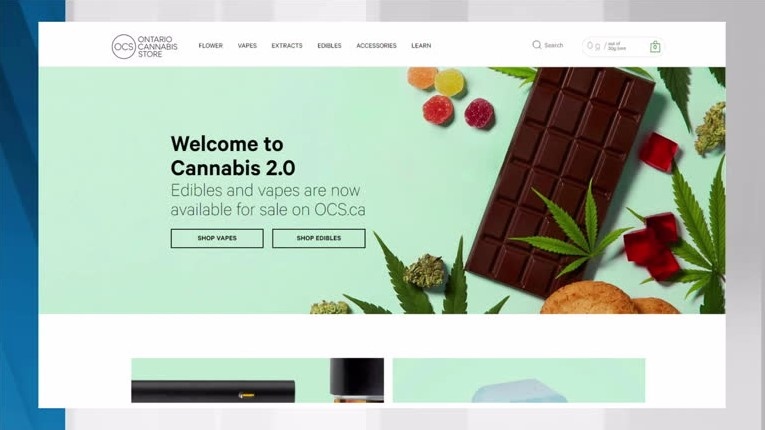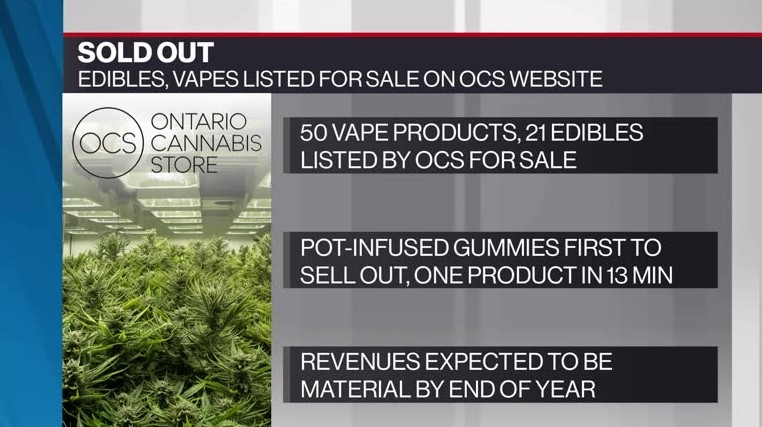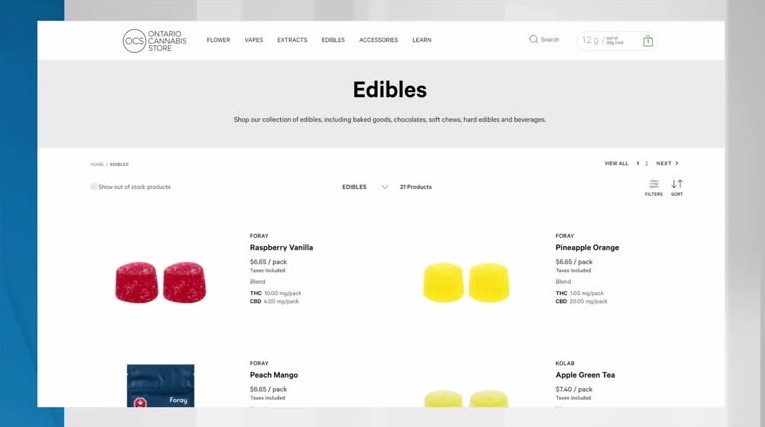SPONSOR: NORTHBUD (NBUD:CSE) Sustainable low cost, high quality cannabinoid production and procurement focusing on both bio-pharmaceutical development and Cannabinoid Infused Products. Learn More.

Legalization 2.0 Product Rollout in Canada

- The approval of these products is significant, both for consumers and for the cannabis industry in Canada
- The infused products sector is large and very lucrative, and has already been hugely successful in parts of the US where cannabis is legal
- It is also one with enormous growth potential. Some estimates suggest that the market will grow by a whopping $17 billion by 2022.
By Matt P
On October 17th, 2019, the Canadian government went ahead with the second phase of its cannabis program. Legalization 2.0 included the approval of edibles and infused products. The move came exactly one year after the first wave of legalization which saw Canada make history, with recreational cannabis flower and oil hitting the legal market for the first time.
The approval of these products is significant, both for consumers and for the cannabis industry in Canada. The infused products sector is large and very lucrative, and has already been hugely successful in parts of the US where cannabis is legal. It is also one with enormous growth potential. Some estimates suggest that the market will grow by a whopping $17 billion by 2022.
While legalization occurred in October, Canadians still had not been able to purchase the new items. January 6th, 2020 marked the first day which vaporizers and cannabis-infused products were widely available to all Canadians.
Why Has It Taken So Long To Get Product Out?
Much of the delay has come from the restrictions imposed by the government. All licensed producers looking to sell these new products are required to submit a 60 day notification directly to Health Canada.
This means that the earliest date they would be available on shelves would be mid-December. The timing was particularly important, since it fell right before the start of the holidays. Retailers and producers were looking to capitalize on making these hot new products readily available for holiday shoppers.
Some retailers and consumers were lucky enough to get a limited supply before the holidays. However, many had to wait until January 6th to finally get their hands on the new goodies.
Legalization 2.0 Product Rollout Across Canada
Whether or not you’ve had access to edibles before now depends largely on which part of Canada you’re living in. Consumers in British Columbia have had access to them since late December. Residents were able to purchase both through BC’s online store as well as through a number of private dispensaries. Edibles hit the shelves just in time for the holidays. Saskatchewan was another province that saw edibles become available just before December 25th.
For other parts of the country, January 6th was the first time residents could pick up the new products. In Ontario, Alberta and Quebec, the rollout for legalization 2.0 was delayed until January. This was mainly due to the fact that all three provinces maintain their own distribution system, as opposed to allowing licensed producers to interact directly with retailers.

Image Courtesy of Alexander Stein
In Alberta, January 6th marked the first day that stores were able to place their orders with the AGLC, which acts as the cannabis wholesaler for the provinces retailers. There are currently a limited number of products available, but that’s expected to change. AGLC spokeswoman Heather Holman commented on the situation, saying that “right now in Alberta, AGLC has contracts with 43 federally licensed producers. They manufacture a variety of products. About half of those licensed producers will be providing for what we’re calling cannabis 2.0 (which are) the new line of products like edibles, extracts and topicals. What we see this week and the coming weeks isn’t reflective of the bigger picture.â€
In Ontario, online sales through the Ontario Cannabis Store began at 9:00am Thursday, January 16th. The store subsequently sold out of all product by 2:00pm on the same day. The online retailer announced last week that they’d be carrying 59 new cannabis products.
Quebec and Legalization 2.0
The situation is significantly more complicated in the province of Quebec. The province has the distinction of having the strictest cannabis laws in the country. The province also passed a law raising the age of consumption to 21 back in October.
Although they officially rolled out the new products this month, these strict laws extend to legalization 2.0. In addition to heavy-handed age of consumption laws, the province has also passed a number of restrictions on these new products. Infused products such as chocolates and baked goods have been banned. So have vape pens and cartridges. Quebec officials enacted the bans based on fears that the products could appeal to minors.
For the time being, it seems that users in Quebec will have to make do with a much more limited selection than the rest of the country.
Issues And Potential Hurdles
Much like the original rollout of legal cannabis flower in 2018, things haven’t gone as smoothly as both the government and cannabis industry would have liked. Along with the delays in multiple provinces, there have also been other issues.
The Aphria Recall
In a case of terrible timing, cannabis giant Aphria was forced to recall its line of vape pens. The recall was due to leaky vape cartridges. According to chief corporate affairs officer Tamara Macgregor, “out of an abundance of caution we asked provincial customers to return certain initially shipped ‘510 cartridges’ that did not meet our intended consumer experience.â€
Like most of the licensed producers in Canada, Aprhia has no doubt had their eyes set on this second wave of legalization (particularly given what a disappointing year 2019 was).
Vaping Restrictions
One of the big issues plaguing the cannabis industry over the past year has been the backlash against vaping across the country. Effective as of January 1st, Ontario has implemented an advertising ban on all vape products in convenience stores and gas stations. The move was prompted from data indicating that more young people are vaping, and is designed to bring the current laws in line with provincial tobacco laws.

Image Courtesy of Lexphumirat
The move didn’t effect the cannabis industry directly. The Ontario cannabis Store and licensed retailers are responsible for the sale of cannabis vapes. However, the fact that provincial lawmakers are willing to target vaping more broadly is troubling. Along with Quebec, Newfoundland and Labrador have also banned cannabis vapes. Officials in British Columbia plan to raise taxes on these products specifically to 20%.
These moves have no doubt left the industry very concerned. Canada will continue to be a proving ground for legalization as Cannabis 2.0 rollout continues.
Source: https://www.puffpuffpost.com/legalization-2-0-rollout-canada-success-and-failure/










